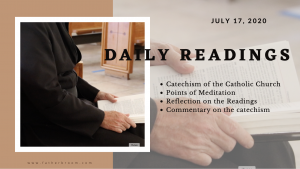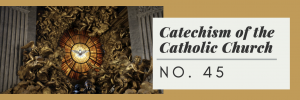
July 17 2020
Friday of the Fifteenth Week in Ordinary Time
Reading 1 IS 38:1-6, 21-22, 7-8
When Hezekiah was mortally ill,
the prophet Isaiah, son of Amoz, came and said to him:
“Thus says the LORD: Put your house in order,
for you are about to die; you shall not recover.”
Then Hezekiah turned his face to the wall and prayed to the LORD:
“O LORD, remember how faithfully and wholeheartedly
I conducted myself in your presence,
doing what was pleasing to you!”
And Hezekiah wept bitterly.
Then the word of the LORD came to Isaiah: “Go, tell Hezekiah:
Thus says the LORD, the God of your father David:
I have heard your prayer and seen your tears.
I will heal you: in three days you shall go up to the LORD’s temple;
I will add fifteen years to your life.
I will rescue you and this city from the hand of the king of Assyria;
I will be a shield to this city.”
Isaiah then ordered a poultice of figs to be taken
and applied to the boil, that he might recover.
Then Hezekiah asked,
“What is the sign that I shall go up to the temple of the LORD?”
Isaiah answered:
“This will be the sign for you from the LORD
that he will do what he has promised:
See, I will make the shadow cast by the sun
on the stairway to the terrace of Ahaz
go back the ten steps it has advanced.”
So the sun came back the ten steps it had advanced.
Responsorial Psalm ISAIAH 38:10, 11, 12, 16
R. (see 17b) You saved my life, O Lord; I shall not die.
Once I said,
“In the noontime of life I must depart!
To the gates of the nether world I shall be consigned
for the rest of my years.”
R. You saved my life, O Lord; I shall not die.
I said, “I shall see the LORD no more
in the land of the living.
No longer shall I behold my fellow men
among those who dwell in the world.”
R. You saved my life, O Lord; I shall not die.
My dwelling, like a shepherd’s tent,
is struck down and borne away from me;
You have folded up my life, like a weaver
who severs the last thread.
R. You saved my life, O Lord; I shall not die.
Those live whom the LORD protects;
yours is the life of my spirit.
You have given me health and life.
R. You saved my life, O Lord; I shall not die.
Alleluia JN 10:27
R. Alleluia, alleluia.
My sheep hear my voice, says the Lord;
I know them, and they follow me.
R. Alleluia, alleluia.
Gospel MT 12: 1-8
Jesus was going through a field of grain on the sabbath.
His disciples were hungry
and began to pick the heads of grain and eat them.
When the Pharisees saw this, they said to him,
“See, your disciples are doing what is unlawful to do on the sabbath.”
He said to the them, “Have you not read what David did
when he and his companions were hungry,
how he went into the house of God and ate the bread of offering,
which neither he nor his companions
but only the priests could lawfully eat?
Or have you not read in the law that on the sabbath
the priests serving in the temple violate the sabbath
and are innocent?
I say to you, something greater than the temple is here.
If you knew what this meant, I desire mercy, not sacrifice,
you would not have condemned these innocent men.
For the Son of Man is Lord of the sabbath.”

Catechism of the Catholic Church
45 Man is made to live in communion with God in whom he finds happiness: When I am completely united to you, there will be no more sorrow or trials; entirely full of you, my life will be complete (St. Augustine, Conf. 10, 28, 39: PL 32, 795}.
 “For greater things you were born.” (Ven. Mother Luisita)
“For greater things you were born.” (Ven. Mother Luisita)
FRIDAY, JULY 17TH Mt. 12:1-8 “I desire mercy and not sacrifice, the knowledge of God, rather than burnt offerings” (Hos 6:6).
Today, Jesus says He desires mercy and knowledge of God. Saint Pope John Paul II wrote in “Dives in Misericordia” (no. 13):
“Mercy is the greatest of the attributes and perfections of God, and the Bible, Tradition, and the whole faith life of the People of God provide particular proof of this.”
“Authentic knowledge of the God of mercy, the God of tender love, is a constant and inexhaustible source of conversion, not only as a momentary interior act but also as a permanent attitude, as a state of mind. Those who come to know God in this way, who ‘see’ Him in this way, can live only in a state of being continually converted to Him. It is this state of conversion which marks out the most profound element of the pilgrimage of every man and woman on earth.”
The hallmark of this “state of conversion” is uniformity with the Will of God, that is to say conforming our will to His Will. When we hear this, hopefully we want to achieve this and are already making a sincere effort. But in truth, we’re not always sure what this looks like. And in this time of pandemic, it can be particularly challenging for us.
St. Alphonsus Marie de Liguori writes about this in clear fashion for our meditation today.
Uniformity with God’s Will… by St. Alphonsus Marie de Liguori (+1787)
Uniformity in all Things. The essence of perfection is to embrace the will of God in all things, prosperous or adverse. In prosperity, even sinners find it easy to unite themselves to the divine will; but it takes saints to unite themselves to God’s will when things go wrong and are painful to self-love.
Our conduct in such instances is the measure of our love of God. St. John of Avila used to say: “One ‘Blessed be God’ in times of adversity, is worth more than a thousand acts of gratitude in times of prosperity.”
Furthermore, we must unite ourselves to God’s will not only in things that come to us directly from His hands, such as sickness, desolation, poverty, death of relatives, but likewise in those we suffer from man — for example, contempt, injustice, loss of reputation, loss of temporal goods and all kinds of persecution. On these occasions we must remember that while God does not will the sin, He does will our humiliation, our poverty, or our mortification, as the case may be.
It is certain and of faith, that whatever happens, happens by the will of God: “I am the Lord forming the light and creating the darkness, making peace and creating evil.” From God comes all things, good as well as evil. We call adversities evil; actually they are good and meritorious, when we receive them as coming from God’s hands: “Good things and evil, life and death, poverty and riches are from God.”
It is true, when one offends us unjustly, God does not will his sin, nor does He concur in the sinner’s bad will; but God does, in a general way, concur in the material action by which such a one strikes us, robs us or does us an injury, so that God certainly wills the offense we suffer and it comes to us from His hands. (Editor’s Note: For our correction or sanctification.)
Thus the Lord told David He would be the author of those things he would suffer at the hands of Absalom: “I will raise up evils against you out of your own house, and I will take your wives before your face and give them to your neighbor.” Hence, too, God told the Jews that in punishment for their sins, He would send the Assyrians to plunder them and spread destruction among them: “The Assyrian is the rod and staff of my anger. I will send him to take away the spoils.”
“Assyrian wickedness served as God’s scourge for the Hebrews’” is St. Augustine’s comment on this text. And our Lord Himself told St. Peter that His sacred passion came not so much from man as from His Father: “The chalice which my Father has given me, shall I not drink it?”
When the messenger came to announce to Job that the Sabeans had plundered his goods and slain his children, he said: “The Lord gives and the Lord takes away.” He did not say: “The Lord gave me my children and my possessions, and the Sabeans have taken them away.” He realized that adversity had come upon him by the will of God. Therefore he added: “As it has pleased the Lord, so is it done. Blessed be the name of the Lord.”
We must not therefore consider the afflictions that come upon us as happening by chance or solely from the malice of men; we should be convinced that what happens, happens by the will of God.
Cesarius points up what we have been saying by offering this incident in the life of a certain monk: Externally his religious observance was the same as that of the other monks, but he had attained such sanctity that the mere touch of his garments healed the sick. Marveling at these deeds, since his life was no more exemplary than the lives of the other monks, the superior asked him one day what was the cause of these miracles.
He replied that he too was mystified and was at a loss how to account for such happenings. “What devotions do you practice?” asked the abbot. He answered that there was little or nothing special that he did beyond making a great deal of willing only what God willed, and that God had given him the grace of abandoning his will totally to the will of God.
“Prosperity does not lift me up, nor adversity cast me down,” added the monk. “I direct all my prayers to the end that God’s will may be done fully in me and by me.”… “That raid that our enemies made against the monastery the other day, in which our stores were plundered, our granaries put to the torch and our cattle driven off — did not this misfortune cause you any resentment?” queried the abbot.
“No, Father,” came the reply. “On the contrary, I returned thanks to God — as is my custom in such circumstances — fully persuaded that God does all things, or permits all that happens, for His glory and for our greater good; thus I am always at peace, no matter what happens.”
Seeing such uniformity with the will of God, the abbot no longer wondered why the monk worked so many miracles.
End of Reflection